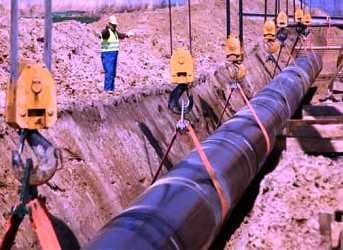The Middle East is not renowned for thinking small, especially in terms of energy projects.
The Jordanian and Iraqi media are announcing, amidst great fanfare, an agreement to construct a 1,043 mile-long new dual $18 billion pipeline, to transit Iraqi crude oil and natural gas to Jordan, capable of transmitting one million barrels of oil and 258 million cubic feet of gas per day from Iraq’s Basra port on the Arabian Gulf to Jordan's Aqaba port in the Gulf of Aqaba on the Red Sea.
The project has apparently moved beyond the planning stage, as Iraq oil ministry's State Company for Oil Projects Director General Nihad Mossa stated that Iraqi Oil Minister Abdul Kareem al-Luaibi has signed an agreement in Baghdad, with the contract being sent to and signed by Jordanian Energy Minister Alaa Batayneh. Mossa commented, "We will immediately undertake all procedures to begin the implementation of this strategic project," adding that a tender will be floated in the first quarter of 2014 to build the pipeline.
Related article: Kurds Seize Oil Initiative in Iraq
The project would be a godsend for energy-poor Jordan, which imports 97 percent of its energy and currently imports 15,000 barrels per day of Iraqi oil via land transport. Since 2011 energy costs have surged in Jordan to above $5 billion per year, equivalent to about 15 percent of its gross domestic product, after supplies of cheap Egyptian gas, which once generated 80 percent of Jordan's electricity, were disrupted by sabotage of a pipeline, which supplied Israel before transiting onwards to Jordan. The pipeline’s surplus is scheduled be exported through Aqaba, generating an estimated $3 billion a year in transit fees for Jordan. As regards natural gas, Jordan requires roughly 100 million cubic feet per day. In the interim, it promises to be a long, hot summer, with Jordan’s government is considering a new power rationing scheme to cope with an expected influx of tourists along with more than 460,000 Syrian refugees who have fled the civil war there into Jordan in the past two years.
The pipeline, which includes extending a sub-line to Jordan’s sole refinery in Zarqa, will be operational by the end of 2017, according to Iraqi officials.
So, why isn’t Jordan floating on a sea of indigenous oil? According to the U.S. government’s authoritative Energy Information Administration, “Jordan, unlike its immediate neighbors, does not possess significant energy resources. As of January 2013, the Oil & Gas Journal estimated Jordan's proved oil reserves at just 1 million barrels and its proved natural gas reserves at slightly more than 200 billion cubic feet (Bcf). Oil shale resources have the potential to increase Jordan's reserves significantly, but as of early 2013 such resources are not yet commercially viable.”
Related article: TURKEY-IRAQI KURDISTAN: Another Step Towards Kurdish Independence
Quite aside from the sticker shock of the cost of the projected twin pipelines, which, if implemented, would be the world’s most expensive pipeline project, is the issue of geography, which a simple look at a map raises.
The shortest route between Basra and Aqaba would transit Saudi Arabia, yet, according to press releases from both the Iraqi and Jordanian governments, no such shortcut is currently under consideration, which would force the pipelines to snake through the central heart of the Sunni insurgency and western Iraq, where al Qaeda remnants supporting the Syrian rebels are active, resulting in a huge horseshoe shape, before finally descending into Aqaba.
Which raises the question – why does Baghdad simply not upgrade its oil infrastructure facilities leading to Basra and its offshore oil export platforms there?
It is certainly easy to understand the appeal of such a project in energy starved Jordan, but the geopolitical issues remain significant and seemingly unresolved.
By. John C.K. Daly of Oilprice.com



















It has been rumoured on and off since 2003 that one of the original aims of the Invasion of Iraq by Zionist Neocons was to build overland pipelines from Basra and other points in Iraq across Jordan to end up in Haifa. It seems they were hoping eventually to persuade the Gulf States to join this network, thereby bypassing Hormuiz, neutralising the Iranian threat to Hormuz, and cutting shipping costs of Gulf and Saudi crude to the West by a considerable amount. This woiuld also have made Haifa the major transit hub for Western oil and Israel wold have benefitted enormously as a result. In an ideal Neocon world...
It seems this Iraqi-Jordanian venture is a pale imitation of that. How will the Israelis react to having an oil transit point right next to their toirist mecca of Eilat? All those tankers spoiling the pristine wilderness of the Red Sea? What if some terrorist decided to blow up a tanker in the Red Sea? The damage to the Red Sea's unique marine environment would be incalculable. Or just an oil spillage?
I doubt Jordan really thoght too hard about these issues. It's so desperate for both energy and hard cash.
Remains to be seen.
"... the original aims of the Invasion of Iraq by Zionist Neocons was to build overland pipelines from Basra and other points in Iraq across Jordan to end up in Haifa."
"zionist neocons"? doesn't that mean "jews" in a slimy, underhanded way? so you're saying the purpose of the invasion of iraq was engineered by the jews, not to unseat saddam hussein, the butcher of baghdad, but to divert oil to haifa?
"... This woiuld also have made Haifa the major transit hub for Western oil and Israel wold have benefitted enormously as a result. In an ideal Neocon world..."
all this was really just to get israel into the oil business? wouldn't it have been a lot simpler to buy 10 or 20 used, liberian-flagged oil tankers, just like everybody else, rather than spend 10 years, $7 trillion, and thousands of casualties?
that's a pretty distorted view of reality.